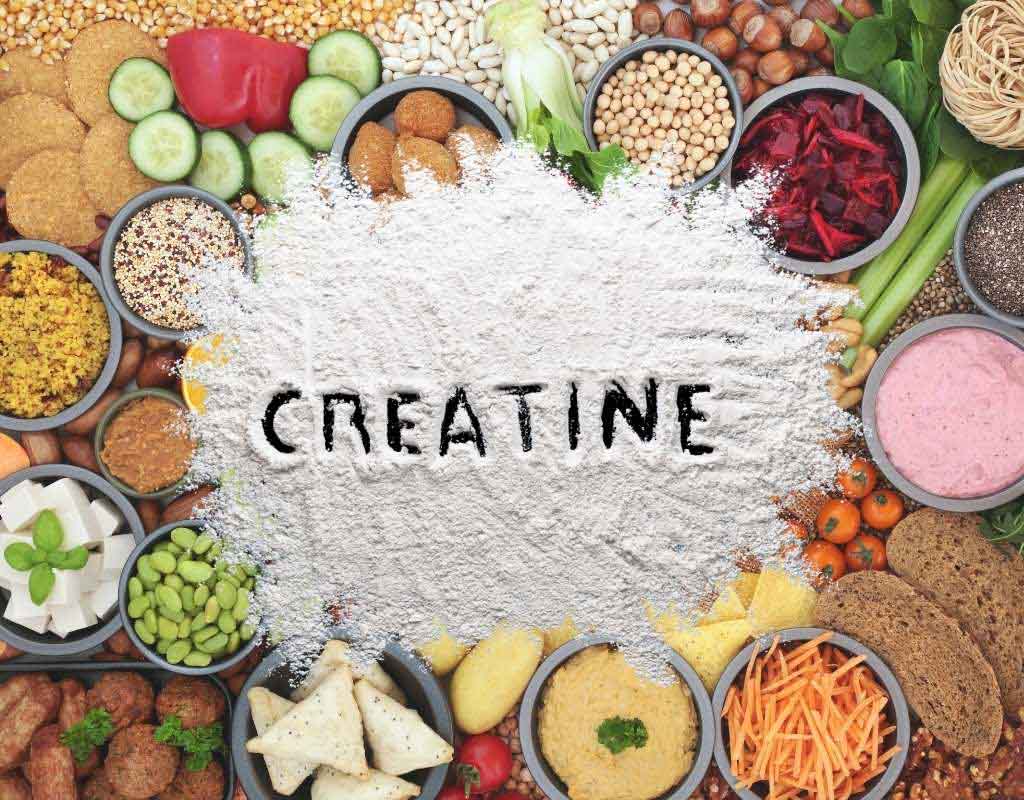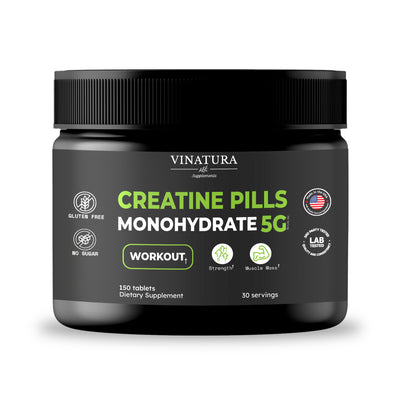
Vegan Source of Creatine: Do Vegans Have Low Creatine Levels?
A vegan diet offers many health and environmental benefits, but does it lead to a deficiency in creatine, a vital compound for muscles and the brain?
Since creatine is primarily found in meat, fish, and animal products, vegans typically do not obtain it from their diet. Can the body produce enough creatine to meet its needs, or do vegans need to seek alternative sources?
This article will clarify the extent of creatine deficiency in vegans, the benefits of supplementation, and how they can optimize their health while staying true to a plant-based lifestyle. Let’s dive in to find the best solutions!
Before exploring further, please read the disclaimer located at the end of this webpage.
Key Takeaways
- Vegans have lower creatine levels due to not consuming animal-based foods.
- Synthetic creatine monohydrate is safe and effective for vegans.
- Creatine supplementation boosts anaerobic exercise performance by 14-20% in vegans.
- Creatine enhances memory and focus, especially in vegans.
- The body produces about 1g of creatine daily, but it’s not enough for vegans.
- Plant-based foods contain no creatine, so supplementation is necessary.
What is Creatine?
Creatine is a natural compound produced in the body, mainly in the liver, kidneys, and pancreas, from amino acids like arginine, glycine, and methionine [3, 9, 11]. It plays a key role in supplying energy to cells, particularly muscles and the brain.
Often described as an “energy reserve,” creatine helps maintain adenosine triphosphate (ATP), the molecule that powers all activities, from intense exercise to thinking [16]. Its ability to quickly regenerate energy makes it essential for enhancing physical performance and supporting overall health.
The benefits of creatine are wide-ranging, extending beyond sports. For muscles, it increases endurance, improves high-intensity exercise performance, and promotes lean muscle growth, especially when paired with resistance training [1, 15].
It also aids muscle recovery after workouts, reduces inflammation and muscle damage, and enhances glycogen storage for sustained energy [10, 18].
Additionally, creatine may support brain health and cognitive performance, particularly in older adults. Some studies are exploring how creatine may influence cellular processes related to brain aging [8, 14].
Creatine is particularly useful for various groups. Athletes and regular exercisers, from weightlifters to swimmers, can use creatine to boost performance [14]. Older adults benefit as it slows age-related muscle loss and improves memory [16].
Notably, vegans, who have lower muscle creatine levels, often experience more pronounced effects from supplementation [1]. With these benefits in mind, the question arises: do vegans truly lack creatine, and how can they effectively supplement this compound? We’ll explore this in the next section.
Do Vegans Have Low Creatine Levels?

People following a vegan diet often have lower creatine levels than omnivores, a difference rooted in their food sources [1]. This makes vegans rely more heavily on their body’s ability to produce creatine, but is this process sufficient to meet their needs?
The human body can synthesize creatine from amino acids like arginine, glycine, and methionine in the liver, kidneys, and pancreas [1]. However, in vegans, the amount produced is often insufficient to match omnivore levels, as vegan diets may lack methionine, a key amino acid for creatine synthesis [4].
Additionally, vitamin B12 deficiency, common among vegans who don’t supplement, can reduce methionine production, further impacting creatine creation [12].
A three-month study on women switching from an omnivorous to a vegan diet found a 14% reduction in muscle creatine levels, clearly demonstrating this deficiency (Blancquaert et al., 2018).
So, is lower creatine a concern for vegans? And how can they maximize creatine’s benefits when their diet lacks direct sources? These questions will be answered next as we explore the specific benefits of creatine for vegans.
Benefits of Creatine for Vegans

Supplementing with creatine can offer significant advantages for vegans. Specifically, it increases creatine and phosphocreatine levels in muscles, plasma, and red blood cells, particularly in areas like the quadriceps and calf muscles [12].
This helps restore depleted creatine levels, bringing them closer to those of omnivores, laying the groundwork for improved health and physical performance [11].
In online discussions about creatine use in vegan diets, many vegans, especially those engaging in high-intensity exercise, report positive experiences with supplementation for better performance.*
Estimates suggest about 50–60% of participants support creatine use, 20–25% are neutral or notice no clear effects, and 15–20% choose not to use it, often due to not pursuing fitness goals or preferring minimal supplementation.*
A unique advantage for vegans is the “super compensation” effect, where their bodies respond more strongly to creatine supplementation than omnivores.
Due to lower baseline levels, supplementation significantly boosts total creatine and phosphocreatine in muscles, sometimes reaching higher levels or increasing at a greater rate than in omnivores [18, 3].
This not only offsets deficiencies but also enhances performance in activities requiring strength and endurance [12]. These benefits are echoed in vegan online communities, with many noting that creatine supports an active, healthy lifestyle.*
Physically, creatine provides clear benefits for vegans during high-intensity workouts. Studies show it improves anaerobic exercise performance, helping vegans sustain energy longer and achieve better results [Barr & Rideout, 2004].
A notable study on recreational athletes found that vegans supplementing with creatine, combined with resistance training, saw greater increases in lean muscle mass, type II muscle fiber size, and exercise output (like knee flexion/extension) compared to omnivores using creatine or placebo groups [5].
These benefits highlight creatine as a valuable tool for vegans to enhance health and performance. So, how can vegans effectively supplement creatine? The next section will explore vegan-friendly creatine sources.
Vegan Source of Creatine
Creatine Supplements

Supplementing with commercial nutrition products is an effective way for vegans to boost creatine levels, especially since their diet lacks natural sources. These products, mainly creatine monohydrate (CrM), are chemically synthesized and animal-free, making them ideal for vegans [8, 6].
Introduced in the 1990s, CrM is the most studied form of creatine, known for its high safety and effectiveness, suitable for those aiming to improve muscle strength and performance [14]. Available in convenient forms like powder, tablets, or capsules, these products allow easy dose control and integration into busy lifestyles.
Despite its benefits, creatine supplementation has some drawbacks. Some users may experience slight weight gain due to increased water retention, especially early on [14]. High initial doses (loading phases) can also cause digestive discomfort, such as bloating or indigestion, in some individuals [11].
To ensure safety and effectiveness, choosing high-quality products from reputable brands is crucial, as lower-quality options may contain impurities that affect health. This raises the question: how can vegans select the right creatine product?
When choosing supplements, vegans should prioritize creatine monohydrate (CrM) due to its well-documented effectiveness, safety, and bioavailability [6]. Users should verify the product’s source and quality certifications to avoid impurities.
Caution is advised with newer creatine forms, like creatine serum, which often lack solid scientific evidence compared to CrM [14]. By selecting reliable products, vegans can safely maximize creatine’s benefits.
Endogenous Production

The human body naturally produces creatine through a process primarily occurring in the liver, kidneys, and, to a lesser extent, the pancreas [8, 7]. This process starts when arginine and glycine combine under the action of the enzyme arginine glycine amidinotransferase (AGAT) to form guanidinoacetate (GAA).
GAA is then converted into creatine in the liver with the help of the enzyme guanidinoacetate N-methyltransferase (GAMT) and S-adenosyl methionine (SAMe) [13]. This continuous process supplies a baseline amount of creatine without relying solely on diet.
Endogenous production offers significant benefits, particularly its natural occurrence. The body produces about 1g of creatine daily, meeting roughly half of daily creatine needs, supporting muscle and brain energy [13, 7]. This is especially critical for those not consuming creatine-rich foods, like vegans. However, this process has limitations, particularly for those on a vegan diet.
While the body can produce creatine, the amount is often insufficient to fully compensate for the absence of dietary sources in vegans, who miss out on creatine from meat, fish, or dairy [17].
Daily, about 1-2% of muscle creatine stores are converted to creatinine and excreted in urine, leaving vegans reliant on endogenous production to maintain levels [13]. As a result, their creatine stores are often significantly lower than those of omnivores, potentially impacting muscle strength and performance.
Are There Any Plant-Based Foods with Creatine?
A common question among vegans is whether any plant-based foods provide creatine, a key compound for muscle and brain energy.
Unfortunately, research shows that plant-based foods contain no creatine [2]. While a typical omnivorous diet supplies about 1g of creatine daily from sources like meat, fish, or poultry, vegans receive none from their diet [7].
The absence of creatine in plant-based foods means vegans must rely entirely on their body’s production or external supplements.
Is Vegan Creatine Effective?
Synthetic creatine, particularly creatine monohydrate (CrM), is a popular solution for vegans to improve health and performance without relying on animal-based foods. Produced entirely through chemical processes, CrM is safe for vegans and highly effective in boosting energy and recovery after workouts [6].
Studies show that CrM helps vegans sustain energy during short, high-intensity activities like sprinting or weightlifting by optimizing ATP energy in muscles [3]. This is particularly valuable for those with active lifestyles, enabling better workout results without quick fatigue.
Beyond physical benefits, synthetic creatine supports mental health in vegans. Research suggests CrM can enhance information processing and reaction speed, especially in tasks requiring high focus [8]. This is a significant advantage for vegans aiming to stay sharp at work or school.
To maximize effectiveness, users should pay attention to dosage and usage. A typical regimen of 3-5g of CrM daily is recommended to avoid stomach discomfort, especially when starting [11].
Conclusion
Vegans often face creatine deficiency since plant-based foods lack this compound, and the body’s natural production falls short of fully compensating. However, synthetic creatine monohydrate offers a safe, effective solution, enabling vegans to enhance muscle strength, exercise performance, and even cognitive function.
By choosing high-quality products and following proper dosage, vegans can overcome this limitation while staying true to their animal-free lifestyle. Are you ready to try creatine to boost your health and performance? Consider consulting a nutritionist to find the best approach for you!
Testimonial Disclaimer
*The testimonials presented on this website are provided by individuals based on their personal experiences with our products. These testimonials represent individual opinions and experiences, which may not be typical or applicable to all users of our products. Results may vary depending on a variety of factors, including individual health, lifestyle, and adherence to product usage instructions.References
- [1] Am, V., & Ww, C. (2006). Vegetarian Diets : Nutritional Considerations for Athletes. Sports Medicine (Auckland, N.Z.). https://pubmed.ncbi.nlm.nih.gov/16573356/
- [2] Balestrino, M. (2021). Role of Creatine in the Heart: Health and Disease. Nutrients, 13(4), 1215. https://doi.org/10.3390/nu13041215
- [3] Barr, S. I., & Rideout, C. A. (2004). Nutritional considerations for vegetarian athletes. Nutrition, 20(7-8), 696–703. https://doi.org/10.1016/j.nut.2004.04.015
- [4] Blancquaert, L., et al. (2018). Changing to a vegetarian diet reduces the body creatine pool... British Journal of Nutrition, 119(7), 759–770. https://doi.org/10.1017/s000711451800017x
- [5] BURKE, D. G., et al. (2003). Effect of Creatine and Weight Training on Muscle... Medicine & Science in Sports & Exercise, 35(11), 1946–1955. https://doi.org/10.1249/01.mss.0000093614.17517.79
- [6] Clarke, H., Hickner, R. C., & Ormsbee, M. J. (2021). The Potential Role of Creatine in Vascular Health. Nutrients, 13(3), 857. https://doi.org/10.3390/nu13030857
- [7] Cooper, R., et al. (2012). Creatine supplementation with specific view to exercise/sports performance... Journal of the International Society of Sports Nutrition, 9(1), 1–11. https://doi.org/10.1186/1550-2783-9-33
- [8] Forbes, S. C., et al. (2021). Effects of Creatine Supplementation on... Journal of Dietary Supplements, 19(3), 318–335. https://doi.org/10.1080/19390211.2021.1877232
- [9] Goldman, D., et al. (2025). Assessing the Roles of Retinol, Vitamin K2, Carnitine... Nutrients, 17(3), 525. https://doi.org/10.3390/nu17030525
- [10] Gualano, B., et al. (2011). In sickness and in health: the widespread application of creatine... Amino Acids, 43(2), 519–529. https://doi.org/10.1007/s00726-011-1132-7
- [11] Gutiérrez-Hellín, J., et al. (2024). Creatine Supplementation Beyond Athletics... Nutrients, 17(1), 95–95. https://doi.org/10.3390/nu17010095
- [12] Kaviani, M., et al. (2020). Benefits of Creatine Supplementation for Vegetarians... IJERPH, 17(9), 3041. https://doi.org/10.3390/ijerph17093041
- [13] Kreider, R. B., et al. (2022). Bioavailability, Efficacy, Safety, and Regulatory Status... Nutrients, 14(5), 1035. https://doi.org/10.3390/nu14051035
- [14] Kreider, R. B., & Stout, J. R. (2021). Creatine in Health and Disease. Nutrients, 13(2), 447. https://doi.org/10.3390/nu13020447
- [15] Rogerson, D. (2017). Vegan diets: Practical Advice for Athletes... Journal of the ISSN, 14(1). https://doi.org/10.1186/s12970-017-0192-9
- [16] Stec, M. J., & Rawson, E. S. (2025). Benefits of Creatine Supplementation for Older Adults. Brazilian Journal of Biomotricity, 4(4), 215–226. http://www.redalyc.org/articulo.oa?id=93021663002
- [17] Watt, K. K. O., et al. (2004). Skeletal Muscle Total Creatine Content... IJSNEM, 14(5), 517–531. https://doi.org/10.1123/ijsnem.14.5.517
- [18] Wax, B. (2021). Creatine for Exercise and Sports Performance... Nutrients, 13(6), 1915. https://doi.org/10.3390/nu13061915
Author

Product Disclaimer
Including an ingredient or study does not evaluate, endorse, or recommend any Vinatura product or any third-party product. Some ingredients discussed may not be used in any Vinatura product.
The content of the articles has not been evaluated by the Food and Drug Administration (FDA) and is not intended to promote or endorse any specific product. Any products sold on this website are not intended to diagnose, treat, cure, or prevent any disease.
Opinions and Endorsements
Any claims, statements, or opinions expressed in the articles are those of the author(s) and do not necessarily reflect the views or opinions of the manufacturers of the dietary supplement products. The products sold on this website are separate from the content of the articles and are not directly endorsed or associated with the information presented here.
Liability Disclaimer
The author(s) of the articles, website, and manufacturers of the dietary supplement products do not assume any liability for any potential consequences arising from the use of the information provided in the articles. Ingredient effects, dosages, and safety vary by individual, formulation, and context; some ingredients interact with medications or may be unsuitable during pregnancy or lactation. It is recommended that individuals consult with a qualified healthcare professional before making any dietary or lifestyle changes, including the use of dietary supplements.
Product Usage
Please refer to the product labels and packaging for specific usage instructions and guidelines for the dietary supplement products sold on this website.
Customer Support
For any concerns or questions regarding the dietary supplement products, please contact our customer support team, who will be more than happy to assist you.





Leave a Comment
Be the first to comment.
What do you think?